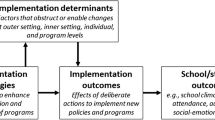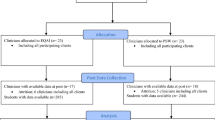Abstract
This study examined the factors that are important to successful implementation and sustainability of evidence-based interventions in school settings. Developers of interventions that have been designated as “evidence-based” in multiple vetted lists and registries available to schools participated in a structured interview. The interview focused on potential facilitators and barriers to implementation and sustainability of their intervention. The interviews were transcribed and coded to identify similarities and differences among the responses as well as themes that cut across participants. Results indicated that those concerned with effective implementation and sustainability need to address several areas: (a) development of principal and other administrator support; (b) development of teacher support; (c) development of financial resources to sustain practice; (d) provision of high-quality training and consultation to ensure fidelity; (e) alignment of the intervention with school philosophy, goals, policies, and programs; (f) ensuring that program outcomes and impact are visible to key stakeholders; and (g) development of methods for addressing turnover in school staff and administrators.
Similar content being viewed by others
References
Atkins, M. S., Frazier, S. L., Leathers, S. J., Graczyk, P. A., Talbott, E., Jakobsons, L., et al. (2008). Teacher key opinion leaders and mental health consultation in low-income urban schools. Journal of Consulting and Clinical Psychology, 76, 905–908.
Bodilly, S. J., Glennan, T. K., Kerr, K. A., & Galegher, J. R. (2004). Framing the problem. In T. K. Glennan, S. J. Bodilly, J. R. Galegher, & K. A. Kerr (Eds.), Expanding the reach of education reforms: Perspectives from leaders in the scale-up of educational interventions. Santa Monica, CA: Rand Corporation.
Domitrovich, C. E., Bradshaw, C. P., Poduska, J., Hoagwood, K. E., Buckley, J., Olin, S., et al. (2008). Maximizing the implementation quality of evidence-based preventive interventions in schools: A conceptual framework. Advances in School Mental Health Promotion, 2, 6–28.
Elmore, R. F. (2002). Bridging the gap between standards and achievement: The imperative for professional development in education. Washington, DC: The Albert Shanker Institute.
Ennett, S. T., Ringwalt, C. L., Thorne, J., Rohrbach, L. A., Vincus, A., Simons-Rudolph, A., et al. (2003). A comparison of current practice in school-based substance use prevention programs with meta-analysis findings. Prevention Science, 4, 1–14.
Fixsen, D. L., Naoom, S. F., Blasé, K. A., Friedman, R. M., & Wallace, F. (2005). Implementation research: A synthesis of the literature. FMHI Publ. No. 231. University of South Florida, Tampa, FL.
Gottfredson, D. C., & Gottfredson, G. D. (2002). Quality of school-based prevention programs: Results from a national survey. Journal of Research in Crime and Delinquency, 39, 3–36.
Greenhalgh, T., Robert, G., Macfarlane, F., Bate, P., & Kyriakidou, O. (2004). Diffusion of innovations in service organizations: Systematic review and recommendations. The Milbank Quarterly, 82, 581–629.
Hallfors, D., & Godette, D. (2002). Will the ‘Principles of Effectiveness’ improve prevention practice? Early findings from a diffusion study. Health Education Research: Theory & Practice, 17, 461–470.
Hoagwood, K. E., Kelleher, K., Murry, L. K., & Jensen, P. S. (2006). Integrated Services Program Task Force. Implementation of evidence-based practices for children in four countries: A project of the World Psychiatric Association. Revista Brasileira de Psiquiatria, 28, 59–66.
Joyce, B., & Showers, B. (2002). Student achievement through staff development (3rd ed.). Alexandria, VA: Association for Supervision and Curriculum Development.
Klein, K. J., & Sorra, J. S. (1996). The challenge of innovation implementation. Academy of Management Review, 21, 1055–1080.
Kratochwill, T. R., Hoagwood, K. E., Frank, J., Levitt, J. M., Romanelli, L. H., & Saka, N. (in press). Evidence-based interventions and practices in school psychology: Challenges and opportunities for the profession. In T. B. Gutkin & C. R. Reynolds (Eds.), Handbook of school psychology (4th ed.). New York: Wiley.
Mihalic, S. F., & Irwin, K. (2003). Blueprints for violence prevention: From research to real-world settings—factors influencing the successful replication of model programs. Youth Violence and Juvenile Justice, 1, 307–329.
Nunnery, J. A. (1998). Reform ideology and the locus of development problem in educational restructuring: Enduring lessons from studies of educational reform. Education and Urban Society, 30, 277–295.
Olin, S. S., Saka, N., Crowe, M., Forman, S. G., & Hoagwood, K. E. (in press). Implementation of evidence-based interventions in schools: Issues and challenges. In S. Rosenfield & V. Berninger (Eds.), Translating science-supported instruction into evidence-based practices: Understanding and applying the implementation process. New York: Oxford University Press.
Payne, A., Gottfredson, D. C., & Gottfredson, G. D. (2006). School predictors of the intensity of implementation of school-based prevention programs: Results from a national study. Prevention Science, 7, 225–237.
Rogers, E. M. (2003). Diffusion of innovations. New York: The Free Press.
Ysseldyke, J., Burns, M., Dawson, P., Kelly, B., Morrison, D., Ortiz, S., et al. (2006). School psychology: A blueprint for training and practice III. Bethesda, MD: National Association of School Psychologists.
Acknowledgments
The authors would like to acknowledge the support of the American Psychological Association (APA) Division 16 Task Force on Evidence-Based Interventions in School Psychology, the Society for the Study of School Psychology, and the National Association of School Psychologists.
Author information
Authors and Affiliations
Corresponding author
Rights and permissions
About this article
Cite this article
Forman, S.G., Olin, S.S., Hoagwood, K.E. et al. Evidence-Based Interventions in Schools: Developers’ Views of Implementation Barriers and Facilitators. School Mental Health 1, 26–36 (2009). https://doi.org/10.1007/s12310-008-9002-5
Published:
Issue Date:
DOI: https://doi.org/10.1007/s12310-008-9002-5




